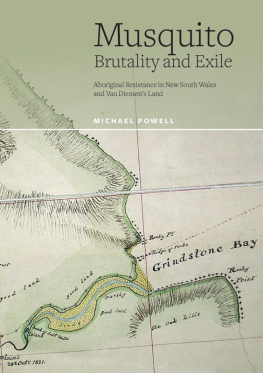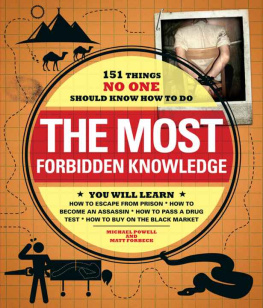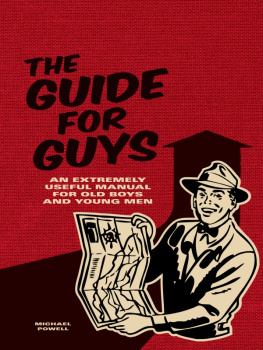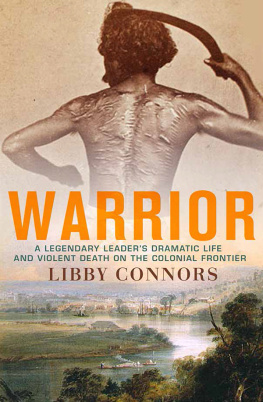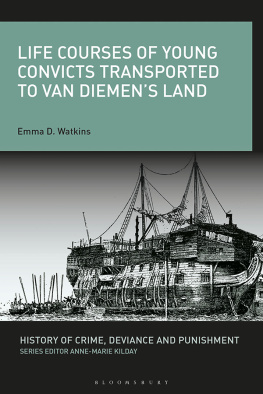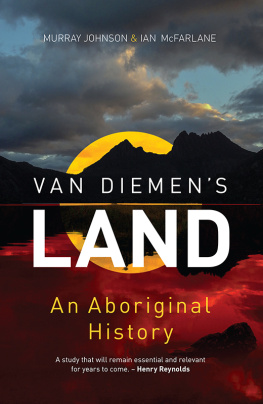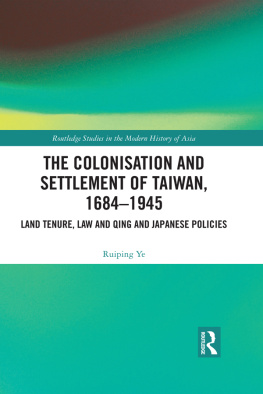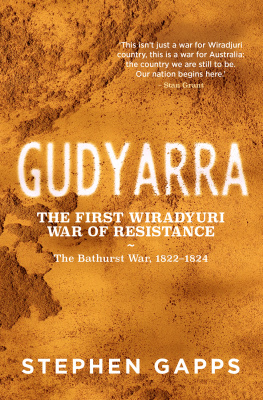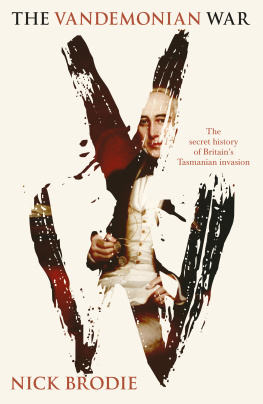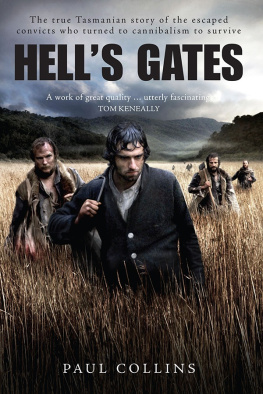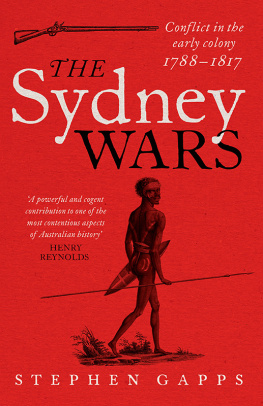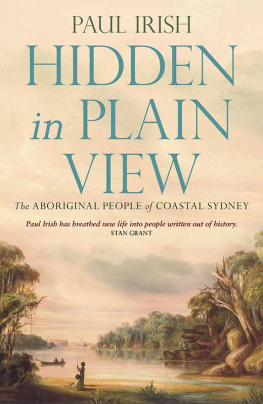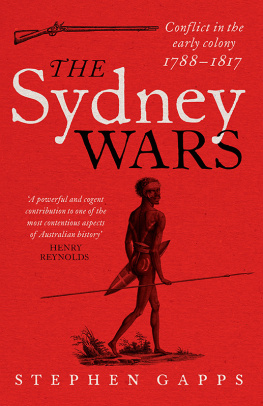Musquito: Brutality and Exile
Aboriginal Resistance in New South Wales and Van Diemens Land
michael powell
Published by Fullers Bookshop Pty Ltd with the assistance of the Plomley Foundation of the Queen Victoria Museum and Art Gallery in Launceston, Tasmania.
Fullers Bookshop
131 Collins Street Hobart TAS 7000
www.fullersbookshop.com.au
First published 2016
Copyright Michael Powell
All rights reserved. This book is copyright. Apart from any fair dealing for the purposes of private study, research, criticism or review, as permitted under the Copyright Act, no part may be reproduced without written permission. Enquiries should be addressed to the publisher.
Series Editor Professor Henry Reynolds
Designed by Julie Hawkins, In Graphic Detail
Printed in Hong Kong by The Australian Book Connection
National Library of Australia Cataloguing-in-Publication entry
Creator: Powell, Michael William, 1949- author.
Title: Musquito: Brutality and Exile. Aboriginal Resistance in
New South Wales and Van Diemens land / Michael Powell.
ISBN: 978-0-9945611-4-5 (ebook)
Series: Studies in the history of Aboriginal Tasmania; 4.
Notes: Includes bibliographical references and index.
Subjects: Musquito 17801825
BushrangersNew South WalesBiography.
BushrangersTasmaniaBiography.
Aboriginal AustraliansBiography.
New South WalesSocial conditions19th century.
TasmaniaSocial conditions19th century.
Dewey Number: 364.155092

For Edwina, whom I have never adequately acknowledged
introduction
Tasmanian history was at the centre of the battlefield during Australias history wars which raged for several years at the start of the 21st century. It was in some ways an unexpected place for island history, so often overlooked in the national story, which has characteristically focussed on the more heavily populated parts of the continent. Melbourne and Sydney usually win hands down in any competition for scholarly attention. But the academic skirmishes were never about the broad range of the Tasmanian experience. It was the fate of the Aborigines and the nature of the black war which stirred deep passions and angry controversy.
Perhaps this should not have been surprising. The story has attracted writers since the middle of the 19th century. It has a richer historiography than almost any other aspect of the national story. This was clearly the case in the 19th century. The work of Henry Melville, John West, James Bonwick and H. Ling Roth outshines any comparable body of work written in the other colonies. And the flow of books continued in the 20th century. I dont think the Aborigines were ever written out of Tasmanian history in the way that commonly occurred in the other states. Clive Turnbulls Black War of 1948 was a mid-century reminder of the violence which accompanied the settlement of the island. Not that Tasmanians ever developed a narrative about peaceful settlement. Bill Stanners famous Boyer Lectures of 1968, After the Dreaming, accused Australians of cultivating a cult of forgetfulness about their violent history and of ignoring the Aboriginal experience. This was a powerful and highly influential polemic and was a fair assessment of national historiography as a whole. But it didnt have the same cogency when applied to Tasmania. Two years before Stanner delivered his lectures, the Tasmanian Historical Research Association had published Brian Plomleys edited version of the diaries and papers of George Augustus Robinson, one of the most important works ever published about the tragic consequences of British settlement.
The interest in the Tasmanian story whipped up during the history wars has continued up until the present. There are good reasons for this. The fate of the Tasmanians has frequently been seen as emblematic of the larger Australian story. Conflict in Tasmania was confined in space and limited in time, giving it dramatic intensity. It is also richly documented. More than any other part of the overall Australian story it has been taken up into the global discourse about genocide, most recently in 2014 by British historian Tom Lawson in his book The Last Man: A British Genocide in Tasmania . The theme was further developed by Noel Pearson in his pamphlet The War of the Worlds.
But the most important work created during this new flowering of scholarship has been produced in Tasmania itself, including The Black War by Nicholas Clements, and Van Diemens Land: An Aboriginal History, co-authored by Murray Johnson and Ian McFarlane. Three further books were not only written, but also published locally, by Clive Tilsley at Fullers Bookshop. The first in the series Studies in the History of Aboriginal Tasmania was Ian McFarlanes Beyond Awakening: The Aboriginal Tribes of North West Tasmania, followed by Graeme Calders Lee, Line and Martial Law: A History of the Dispossession of the Mairremmener People of Van Diemens Land, 18031832, and Grease and Ochre: the blending of two cultures at the colonial sea frontier by Patsy Cameron.
It is therefore with great pleasure that I introduce the fourth book in the series, Michael Powells fine study of Musquito. It would be tempting to use that ubiquitous tag employed by publishers and declare that is the forgotten story of an Aboriginal rebel. But it would be more accurate to say that Musquito is little known rather than forgotten, and that Michaels biography is a major contribution to Australias early colonial history. Musquito was a truly a remarkable character whose career saw him in New South Wales, Norfolk Island and Van Diemens Land. Michael is able to write with deep understanding about each of these destinations. He deals with great authority about early New South Wales, both the ragged early penal colony and the besieged Aboriginal bands, as well as the conflict which broke out on the Hawkesbury, Australias first frontier. Musquito was one of the most formidable opponents of the settlers and when captured was exiled to Norfolk Island. He lived among the convicts, while not one himself. When the Norfolk Islanders were shipped off to the tiny, struggling colony in Van Diemens Land Musquito accompanied them, becoming in effect a colonist himself, partly assimilated and certainly speaking the rough English argot of the convicts. He knew nothing of the manners, beliefs or languages of the Tasmanian Aborigines. For a variety of reasons, which Michael thoroughly explores, Musquito rebelled against the settler world he knew so well and retreated into the bush. He became associated with local Aboriginal bands in the earliest stages of the black war. He was eventually captured and hung in Hobart.
It is truly an epic tale, replete with variety and drama, and one which illuminates many aspects of early Australia. There is surely no other single character British or Aboriginal who experienced so many different chapters of colonial life. And it is a story which Michael Powell unfolds with skill and inimitable flair.
Henry Reynolds, July 2016
TERMINOLOGY
Historians tread a wary path through terminology when dealing with the delicacy of feeling in Indigenous history. Offence, perceived or invented, is never far away but some caveats need to be made.

